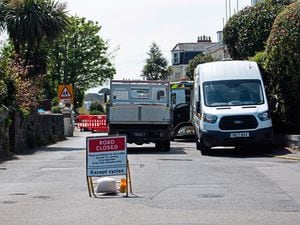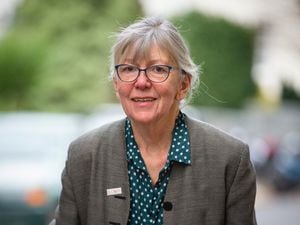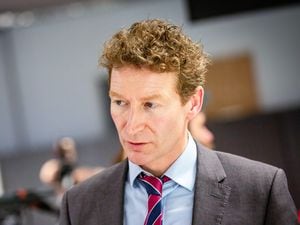Removal of Fort George waste screen ‘is a pollution hazard’
REMOVING a screen which stopped non-biodegradable items from entering an outfall has given about 70 properties a free pass to flush whatever rubbish they like out to sea, a spokesman for an environmental campaign group has said.

Pierre Ehmann of Green Guerns’ comment follows the news that Guernsey Water ‘temporarily’ removed the screen which stopped larger items from entering an outfall at Fort George because the screen was full and needed to be cleared.
The screen was installed in December 2017, in an effort to tackle non-biodegradable flushed items going into the sea.
According to Guernsey Water, the removal was necessary because of the increased amount of waste water, which is being put down to more people living there during the pandemic.
Mr Ehmann said Green Guerns acknowledged that non-biodegradable waste being flushed down the loo was nothing new and is an island-wide problem that requires an island-wide approach to tackle it.
‘But when you can pinpoint specifically to 70 properties that have blocked up their sewage outflow by the sheer quantity of non-biodegradable waste being flushed, you have the root of a problem in clear sight,’ he said.
‘The filter at Fort George appears to have been built for average consumption needs, but clearly home owners of Fort George moving back to the island, making use of our Covid-free status, has pushed this filter to breaking point. Not so nice for the people at Fort George, not so good for our precious sea life and swimmers.’
Green Guerns work closely with the Clean Earth Trust, particularly the head of community engagement Helen Quin who said an important reminder was that there is only one ocean, so where we pollute part, we pollute the whole.
The screen is thought to have been removed around mid-January and Guernsey Water’s general manager Steve Langlois hoped to find a solution before the end of March, meaning there could be up to 10 weeks with no protection.
‘We know that 81 tonnes, or 81,000kgs, of waste was removed in 2019 from Belle Greve which services the majority of the island,’ Ms Quin said.
‘If Fort George, as Mr Langlois stated in a radio interview, represents 0.3% of their customers, we can speculate that Fort George would produce 243kg per year, and therefore 4.7kg per week.’
Over 10 weeks, that would amount to 47kg.
‘Would anyone be happy seeing someone walk down to Soldier’s Bay and dump 47 kilogram bags of trash directly in the water?’ she asked.
‘It’s also a kick in the teeth to the proactive efforts of the community who beach clean on a daily basis.’
She believed people had a perception that their impact, perhaps their one cup, straw, wrapper, tampon, nappy, or cigarette, would not make a difference.
‘But we need to ask ourselves the question, what is the right amount of litter in the environment? There isn’t one, the answer is zero. It simply doesn’t belong there.’
This year the Clean Earth Trust has started surveying their beach cleans in line with the Marine Conservation Society.
At Cobo and L’Eree, they have stripped down what was found so that they can start building a more detailed understanding of plastic affecting local waters.
During an hour-and-a-half at L’Eree last weekend, 773 pieces of plastic and polystyrene up to 2.5cm were found and 248 pieces between 2.5cm and 50cm were found.
‘The whole and larger pieces are somewhat easier to identify, pick and collect, but there is an endless supply of them, and even more so when decisions like [removing the screen] are made,’ Ms Quin said.
‘These pieces that drift about the ocean are subject to weathering, where it will break down into the smaller pieces, and then smaller again into microplastics.
‘These are literally infecting our environment, killing wildlife and now being found in the placentas of unborn babies, which was noted in a recent research journal published by Environment International. There are staggering statistics out there on the amount of plastic that just we as humans ingest on an annual basis, yet we have a level of conscious choice of what we eat. Animals do not.’
Green Guerns believe simply fitting a larger filter ignores the root cause of the problem.
Mr Ehmann said more needed to be done to educate islanders on what is acceptable to flush and how to limit the use of harmful single-use plastics in homes, in the environment and in our pockets.
‘A simple rule; if you’re going to use it in the bathroom and it’s not biodegradable don’t bother buying it,’ he said.
The environmental campaign group wants to see a greater emphasis on educating the residents responsible, highlighting what is not acceptable to flush and, if the problem persists, look at repercussions.
‘Residents should not be given a green light to pollute our ocean further.
‘However, our response to the situation at Fort George highlights a broader concern, as Sue Daly recognised on BBC Radio Guernsey [by saying] “An island as affluent and sophisticated as ours should not be sending untreated sewage into the sea”.’
He urged islanders to participate in one of the Clean Earth Trust’s weekly beach cleans, saying they would witness first-hand the quantities of single-use plastics in the environment.
‘With enough hands we may just remove 47kg worth,’ he said.
n The screen was fitted to an outfall pipe which serves about 75 properties which carried their waste into the sea off the east coast. The pipe is located towards the southern end of the Lower Lines (La Corniche) where it passes down the cliff and extends approximately 30 metres from the base out into the sea. As a result of an outfall dispersion survey carried out by Guernsey Water in 2016, it emerged that the waste waster coming out of the fort could have an adverse effect on Soldiers Bay. It was decided to install a passive screen which removed non-biodegradable material such as plastics.





